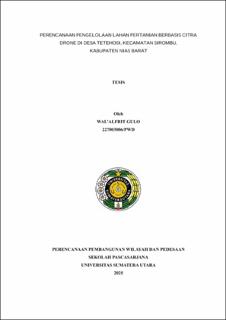| dc.description.abstract | Tetehosi Village, located in Sirombu District, West Nias Regency, possesses
considerable agricultural potential, yet lacks sufficient spatial data to support effective
land management and planning. This study aims to design an agricultural land
management strategy based on drone imagery technology as a solution to the absence
of accurate and up-to-date land cover data. The methodology involves aerial image
acquisition using a DJI Mavic 3 Enterprise drone, image processing through Agisoft
Metashape, and spatial analysis using ArcGIS 10.8. The results indicate that
agricultural land in Tetehosi consists primarily of rice fields, coconut, rubber, areca
nut, and mixed gardens. The thematic maps produced effectively visualize the
distribution and classification of land cover in high resolution, providing precise spatial
information to support informed decision-making. Furthermore, a SWOT analysis was
conducted to identify strengths, weaknesses, opportunities, and threats associated with
the implementation of drone technology in rural areas. The findings confirm that the
integration of drone imagery and Geographic Information Systems (GIS) significantly
enhances the accuracy of land use planning and the sustainable management of
agricultural resources. Strategic recommendations include strengthening local human
resource capacity, improving technological infrastructure, and developing a digital
agricultural database as essential steps toward advancing precision agriculture in rural
regions. | en_US |


